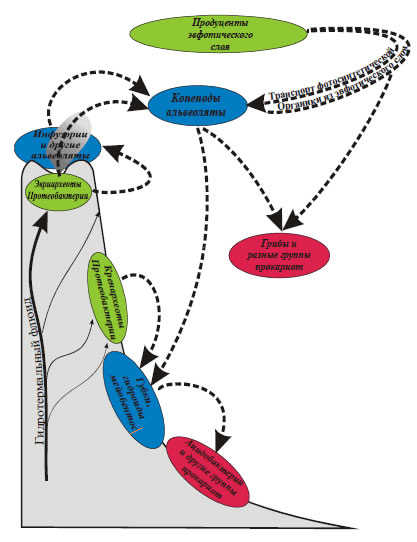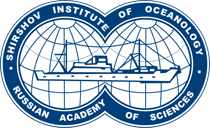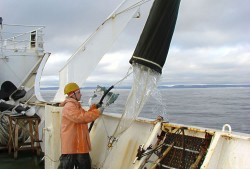MARINE ECOLOGY
Division Head Prof. Andrey Gebruk
Scientific Head Prof. Mikhail Flint, Academician of RAS
1957 First ultra-abyssal reserch. Life found at depths exceeding 7 km
1990s Six new species of benthic fauna were discovered using deep-sea submersibles Mir
1997 Mirocaris sp. shrimps found on the Mid-Atlantic Ridge and named after submersibles Mir
2007-2016 Six expeditions to the Kara Sea and the Laptev Sea were conducted to investigate the ecosystems’ state. New data on the current abnormally warm conditions in the Arctic
Children categories
Plankton Ecology Laboratory
Head: Academician of RAS, Prof. Mikhail Flint
Marine Ecology Department

The main directions of study:
Structure and dynamics of ocean pelagic eco systems (primary production, heterotrophic destruction, phyto– and zooplankton ecology,trophic interactions, detritus fluxes into the deep ocean).
Biota in the marine carbon cycle.
Mesoscale processes in the structure and produc tivity of pelagic ecosystems.
Ecosystem dynamics in the Black Sea with the im pact of human activities and climate change.
Laboratory of Ocean Ichthyofauna
Head: Dr. Alexei M. Orlov
Marine Ecology Department

The main directions of study:
Ichthyofauna: its taxonomy, evolution and zoogeography; structure of ichthyocenoses and its relation to environmental conditions in pelagic and bottom habitats.
Natural and anthropogenic variability of marine ichthyocenoses.
Composition, distribution, productivity and cataloging of ichthyofauna of high- and low-latitude regions.
Ichthyocenoses of sea mounts and coral reefs, their structure and productivity.
Reproduction and development parameters of sea fish and their relationship with environmental conditions.
Composition and distribution of ichthyoplankton in Russian seas and in the World Ocean.
Laboratory of Plankton Communities Structure and Dynamics
Head: Associated member of RAS, Prof. Alexandеr Vereshchaka
Marine Ecology Department

The main directions of study:
Phyto- and zooplankton communities of the open areas of the World ocean and Russian seas.
Plankton the near-bottom layer, deep-water plank ton communities, plankton of hydrothermal vents.
Nanobiota: composition, role in marine commu nities and biogeochemical cycles, evolution.
Impact of invading species over marine ecosystems.
Genetic and morphological and biodiversity of plankton.
Anthropogenic and natural radioactive nuclides in marine ecosystems.
Poster about the Laboratory (pdf)
Laboratory of Ocean Benthic Fauna
Head: Prof. Andrey Gebruk
Marine Ecology Department

The main directions of study:
Large-scale distribution patterns of benthic fauna in the World Ocean.
Composition, distribution, ecology and the formation history of the main benthic fauna biotopes.
Adaptations of deep-sea fauna.
Biogeographic zoning of the World Ocean floor.
Structural and functional features of deep-sea benthic communities.
Marine Mammals Laboratory
Head: Dr. Roman Belikov
Marine Ecology Department

The main directions of study:
Dynamics of species composition and population of marine mammals under the influence of natural and anthropogenic factors.
Acoustic communication between marine mammals.
Marine mammals behaviour and their adaptation to extreme conditions.
Fundamental principles of marine mammals protection.
Bio-Hydrochemistry Laboratory
Head: Dr. Alexander Polukhin
Marine Ecology Department

The main directions of study:
Chemical components of aquatic ecosystems; dynamics of nutrients.
Transport and transformation of nutrients at interfaces in marine environment.
Electronic data bases and atlases on regional hydrology and hydrochemistry.
Comprehensive hydrochemical analyses of natural waters and sediments.
Creation and maintenance of the autonomous seafloor station for registering chemical exchanges on the water-bottom interface.
CO2 cycles in the ocean – atmosphere system at present and in the geological past of the Earth.
Laboratory of Ecology of Coastal Bottom Communities
Head: Prof. Vadim Mokievsky
Marine Ecology

The main directions of study:
Identification of regularities in the spatial organization and temporal dynamics of benthic communities, analysis of changes in the species composition, trophic and functional structure of communities in various regions of the World Ocean.
The object of research is the main size-ecological blocks of bottom ecosystems: micro-, meio- and macrozoobenthos, macrophyte algae and microphytobenthos.




